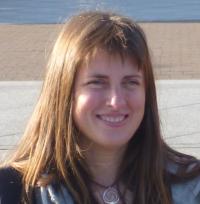Going Beyond 5G Beamtraining

Speaker: Prof. Nuria González-Prelcic
Affiliation: University of Vigo, Spain / The University of Texas at Austin
Abstract: A major challenge in millimeter wave (mmWave) communications is to configure the hybrid antenna arrays in the transceivers. Furthermore, the mobility of the users in mmWave cellular networks makes it necessary to periodically reconfigure these arrays, according to the variations of the channel. The array configuration/reconfiguration approach followed in the recently released 5G standard is based on beamtraining, following the same philosophy as in previous WiFi standards to operate at mmWave frequencies. The beam training strategy is effective for initial access in a cellular scenario because it enables synchronization at high SNR conditions. It also introduces, however, a huge overhead in the communication system. An alternative to configure the hybrid arrays is based on channel estimation and tracking of the high dimensional mmWave MIMO channel. Some prior work proposes low overhead solutions to the channel estimation and tracking problem, exploiting the sparse nature of the mmWave channel, statistical priors and a time variation model for the channel. Most of these approaches assume that the received signal is already synchronized. To compare the performance and overhead of array configuration based on channel estimation to those of channel estimation, joint synchronization and channel estimation/tracking strategies have to be developed. This talk reviews the initial work on this research line and provides preliminary comparisons to 5G beamtraining/synchronization. Simulation results showing how joint channel estimation and synchronization strategies beat the 5G beamtraining strategy will also be provided.
Biography: Nuria González-Prelcic is currently an Associate Professor in the Signal Theory and Communications Department, University of Vigo, Spain (on leave) and a Senior Research Scientist at The University of Texas at Austin. She has held visiting positions with the University of New Mexico (2012), and The University of Texas at Austin (2014, 2015, 2016). Her main research interests include signal processing theory and signal processing for wireless communications: filter banks, compressive sampling and estimation, multicarrier modulation, channel estimation and MIMO processing for millimeter wave communications. She has co-authored more than 50 journal and conference papers in the topic of signal processing for MIMO communication, especially mmWave communication, where sparsity plays a key role. She has also co-authored a tutorial IEEE Journal of Selected Topics in Signal Processing on mmWave MIMO and was also a guest editor for the same special issue. She has co-organized several special sessions on millimeter wave MIMO communications for SPAWC 2015, Asilomar 2016, Camsap 2017, SPAWC 2018 or Asilomar 2018. She has co-delivered with Dr. Robert Heath several tutorials on mmWave MIMO at conferences such as ICASSP, Globecom or WCNC and the IEEE SPS Summer School on Signal Processing for 5G Wireless Access.
For more information, contact Prof. Danijela Cabric (danijela@ee.ucla.edu)
Date/Time:
Date(s) - Nov 19, 2018
11:00 am - 11:30 am
Location:
E-IV Tesla Room #53-125
420 Westwood Plaza - 5th Flr., Los Angeles CA 90095
